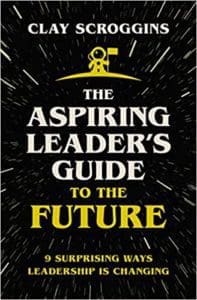- Home
- Entertainment
- Even the GOATS Will Have a Coach

Even the GOATS Will Have a Coach
 Excerpt taken from The Aspiring Leader’s Guide to the Future: 9 Surprising Ways Leadership Is Changing by Clay Scroggins
Excerpt taken from The Aspiring Leader’s Guide to the Future: 9 Surprising Ways Leadership Is Changing by Clay Scroggins
Chapter 3
Even the GOATS Will Have a Coach
It’s the spring of 1997. The Spice Girls have just released their debut single, “Wannabe.” A young by the name of Leonardo DiCaprio is in the studio filming Titanic alongside Kate Winslet. And in the small town of Augusta, Georgia, Tiger Woods has won his first career Masters Tournament, setting records for lowest score to par and the largest margin of victory (twelve strokes) in tournament history.
After that huge win and at that point in his early career, Tiger Woods had won 21 percent of the PGA Tour events he entered and 25 percent of the majors he attended. His historic win at Augusta had a feeling of inevitability to it—it was never a matter of if, but when. By the end of that season, Tiger had won two more PGA events and received the title of PGA Player of the Year. Needless to say, his golf game was in pretty good shape.
Then he decided to change his swing.
Where I grew up, we had a saying: “If it ain’t broke, don’t fix it.” Well, Tiger either hadn’t heard that phrase or chose to ignore it. Either way, he was taking a huge risk in turning to legendary golf coach Butch Harmon for a swing change. Apparently, Tiger believed that “his club shaft was across the line at the peak of his backswing, with his clubface closed.”¹ Whatever that means.
Harmon said he agreed with Tiger’s self-assessment, but he wanted to fix the problems one piece at a time. He warned Tiger that this type of adjustment would likely make him less competitive on tour and advised Tiger to consider taking the year off if he was going to pursue such a sweeping change to his game. In typical fashion, Tiger rejected that plan, insisting they fix it all at once.
Well, Butch Harmon was right … kind of. In 1998 Tiger won only once, leading many journalists to question whether his success had been a flash in the pan. Would Tiger be a lightning strike—one flash of brilliance and then gone forever? Well, we now know the ending to this story. But the bounce back came about faster than you might have guessed.
The next year (1999), Tiger Woods won eight tournaments, including the PGA Championship. And the year after that, he won nine—including a record-tying six tournaments in a row, including the US Open, the Open Championship, and the PGA Championship yet again. Also, at that year’s US Open, he broke or tied nine tournament records before becoming the youngest golfer to achieve the career Grand Slam (winning all four major tournaments). He was named Sports Illustrated’s Sportsman of the Year, becoming the first person to receive the award twice and the only person besides LeBron James to hold that claim. And if that wasn’t enough, he went on to win the 2001 Masters, making him the only player ever to win four consecutive major golf titles.
He was unstoppable. PGA Tour events were suddenly where the best golfers in the world came to compete for second place. It wasn’t a question of beating Tiger—it was a question of keeping it close. Since that time in the late nineties, Tiger’s career has had more than its fair share of ups and downs. But for a time he was untouchable, the undisputed greatest of his time and arguably the GOAT—the greatest of all time.
And all this after turning to his coach and asking him to help fix a swing that wasn’t broken.
Hungry Humility
On the surface, Tiger’s story provides a unique example of humility. Seen by many as someone at the peak of his career, Tiger not only listened to the advice of his coach—he asked for it. Harmon has repeatedly referred to Tiger as “a sponge,” implying that he sought counsel and input, always looking for ways to improve his game. He found a mentor. He asked questions. He listened to advice. Of course, Tiger wasn’t an apathetic follower. He didn’t blindly listen to whatever Butch Harmon had to say. But he welcomed the ideas of others, even though he was one of the best in the world.
I’m always encouraging people (young men in particular) to find a mentor—someone older, wiser, and more experienced who can guide them through life. But like many things we know we should do, we sometimes make being mentored another box we check off. Seeking out a mentor is more than asking someone, “Will you be my mentor?” That alone is not enough. If you want the most from a mentor, you need to put some thought into what you want beforehand. What do you want from a mentor? What’s the purpose, the goal of getting together?
A great mentor-mentee relationship has defined rhythms and expectations. Finding a mentor or coach requires not only humility but also a hunger for something more. Humility says, “I can’t do this alone, and I need the help of someone who knows better than I do.” Hunger says, “This is the mountain I want to climb, and I want to do what it takes to get there.”
Tiger didn’t simply go to Harmon and say, “Will you fix my swing?” He had an idea of what he wanted. He said this is what I want to fix, and this is how I want to fix it. His goal wasn’t simply to win; it was to dominate. And Tiger knew he needed help to get there. Tiger’s humility in combination with his hunger and drive to win sets his story apart. He wanted his golf swing to look perfect while he dominated. And getting there required him to know himself—both his strengths and his weaknesses. Aspiring future leaders will have a good gauge on both of these, knowing where they are strong and where they are weak and need help to grow.
Think of a mentor as a fly-fishing guide. If you gave me a rod, a reel, and some flies, I could go out and catch fish. I could. It might take me a few days before I caught my first one, but I could do it with enough trial and error. I’d eventually figure it out and find the right place to catch something. But why wouldn’t I hire a guide, someone who knows the river intimately, to tell me where to go? No one thinks less of someone who hires a fly-fishing guide. That’s what you’re supposed to do. That’s how you find the fish—you ask someone who knows. The same is true for young leaders seeking a life coach.
While the need for a guide may seem self-evident to many of you, I emphasize it because there is a false notion that asking for help is a sign of weakness. Well, it isn’t. The real sign of a weak leader is not asking for help. When you think you can do it alone, you’re delusional, kidding yourself that you are wiser, smarter, and better than you really are. If the GOAT—the greatest of all time—needs a coach, it’s a good bet you need one too. But there are two contrasting vices you’ll need to overcome before coaching will be of help to you.
I Can Do This on My Own
When I was talking with a friend the other day, he shared his experience of going to counseling. Like many people, I have long held the wrong-headed idea that counseling is only for people who have experienced something really bad in life or are going through something exceptionally hard. So I was curious to learn why this friend—someone I know very well and who didn’t seem, at least on the surface, to have a ton of issues to work through—was seeing a counselor. And so I asked him: “Why are you seeing a counselor?”
His answer was surprisingly simple: “Because my counselor wants to help me.” That’s it. There were no earth-shattering revelations. He told me this was the one hour each week when he could talk to someone about the good and the bad, about what was going well and what wasn’t, and this person just listened, offering counsel where they could. Now, I’m not suggesting a coach is a fill-in for a counselor, as if these roles are interchangeable. But I think something about my friend’s attitude toward counseling is helpful.
I was struck by the fact that he felt no shame in seeing a counselor. He wasn’t trying to work through some deep, dark secret or terrible trauma. He just wanted help. For some reason, for many leaders (and aspiring leaders), asking for help isn’t always seen as acceptable. We are conditioned—especially in Western leadership culture—to do everything on our own. We’re told that success in life is about our performance as individuals and that it all depends on honing our own capabilities and overcoming our limitations.
But that’s not true. Not only is this thinking antithetical to God’s design for his church, but it works against our identity as individuals created in God’s image. Any healthy society or culture is more than a collection of isolated individuals. It’s easy for me to point this out and for you to nod your head in agreement (I don’t assume you’re actually nodding your head along with me, but maybe internally). But it’s not easy to overcome the cultural pressures and to make asking for help a normative practice in our lives.
No one wants to acknowledge their weaknesses, let alone say them aloud. But your weaknesses will hold you back if you keep them to yourself. We were not designed to take care of ourselves apart from others. Shout-out to the garden of Eden: “Then the Lord God said, ‘It is not good that the man should be alone; I will make him a helper fit for him’” (Genesis 2:18 ESV).
When God made the world, everything he made was very good, except for one thing—Adam was all alone. If you’re going through life alone right now, trying to do it all on your own, you’re not living out God’s design, and you can probably sense that something is off. While this passage speaks directly of the relationship between a husband and wife, it’s about more than that. In the New Testament, the apostle Paul constantly preached about the body of Christ, emphasizing that God’s vision for his people is one of unity in committed relationships with others, seeking to honor God together. That’s what we were made for!
I have no doubt that Tiger Woods would still be a good golfer even without the help of Butch Harmon. But I’m grateful that he asked for help because we were able to witness something better than good—we all got a taste of greatness. And I have no doubt that you are a good leader. Bad leaders don’t read books on leadership. But I know you can be more than a good leader. You can be a great leader if you invite someone to help.
Maybe you still think you can become a great leader on your own. If so, good luck. Prove me wrong. Even if you do, I can guarantee you will become exhausted in the process. So ask yourself, “Why not ask for help? Why not share my weaknesses with someone who can help me sharpen them? Why not lean into the design that is woven into my very being?”
Seriously. Why not?
…
Order your copy of The Aspiring Leader’s Guide to the Future: 9 Surprising Ways Leadership Is Changing by Clay Scroggins
Image Credit: Omar Rawlings / Tiger Woods / CC BY-NC-ND 2.0
Trending Now
Sign up today for your Inspiration Today Daily Newsletter
Supercharge your faith and ignite your spirit. Find hope in God’s word. Receive your Inspiration Today newsletter now!
Clay Scroggins
Clay Scroggins is the best-selling author of How To Lead When You’re Not In Charge, and How To Lead In A World of Distraction. For over two decades he worked at North Point Ministries, starting as a facilities intern (a.k.a. vice president of nothing) and eventually becoming the lead pastor of their largest campus. Clay is now a sought-after leadership speaker, engaging audiences that include the Atlanta Hawks, Mercedes Benz, Chick-fil-A, Federal Reserve Bank, and Terminus. Clay graduated from Georgia Tech with an Industrial Engineering Degree and continued on to acquire a Masters and Doctorate from Dallas Theological Seminary. Clay and his wife, Jenny, have five children and live in Atlanta. Learn more at clayscroggins.com
Related Articles
March 10, 2025
Finding Total Victory on the Road to Championship
I have been playing competitive golf for 55 years. Through the various stages of my life, my…
March 7, 2025
Average Joe Movie: SCOTUS, Praying Football Coach Backstory
When Coach Joe Kennedy knelt to pray at the 50-yard line after a high school football game, he had…
February 28, 2025
The Power of Story: A Muslim Journey to Hope
Storytelling is one of the oldest and most powerful ways to touch the human heart. Parents tell…
February 27, 2025
‘Harriet’ Movie: Courage, Freedom, Faith
Antebellum abolitionist Harriet Tubman had convictions and courage that helped free herself…
Next Steps To Strengthen Your Walk
Inspiration Today Newsletter
Supercharge your faith and ignite your spirit. Find hope in God’s word. Receive your Inspiration Today newsletter now!
Christian Articles
Find articles to strengthen your walk and grow your faith. We have a wide range of topics and authors for you.
Submit A Prayer Request
We are here for you. Simply click on the button below to reach us by form, email or phone. Together we will lift our hearts and voices with you in prayer.





